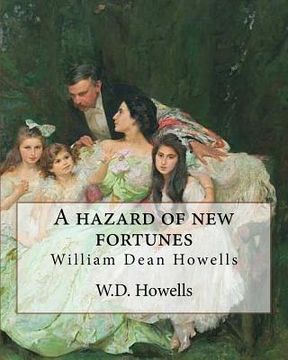A hazard of new fortunes, By W.D.Howells A NOVEL (World's Classics) illustrated: William Dean Howells (en Inglés)
Reseña del libro "A hazard of new fortunes, By W.D.Howells A NOVEL (World's Classics) illustrated: William Dean Howells (en Inglés)"
A Hazard of New Fortunes is a novel by William Dean Howells. Copyrighted in 1889 and first published in the U.S. by Harper & Bros. in 1890, the book was well-received for its portrayal of social injustice. Considered by many to be his best work, the novel is also considered to be the first novel to portray New York City.Some argue that the novel was the first of three Howells wrote with Socialist and Utopian ideals in mind: The Quality of Mercy in 1892, and An Imperative Duty in 1893. In this novel, although Howells briefly discusses the American Civil War, he primarily deals with issues of post-war "Gilded Age" America, like labor disputes, the rise of the self-made millionaire, the growth of urban America, the influx of immigrants, and other industrial-era problems. Many critics consider A Hazard of New Fortunes to be one of Howells' most important examples of American literary Realism because he portrays a variety of people from different backgrounds. Plot summary--The book, which takes place in late 19th century New York City, tells the story of Basil March, who finds himself in the middle of a dispute between his employer, a self-made millionaire named Dryfoos, and his old German teacher, an advocate for workers' rights named Lindau. The main character of the novel, Basil March, provides the main perspective throughout the novel. He resides in Boston with his wife and children until he is persuaded by his idealistic friend Fulkerson to move to New York to help him start a new magazine, where the writers benefit in a primitive form of profit sharing. After some deliberation, the Marches move to New York and begin a rather extensive search for a perfect apartment. After many exhausting weeks of searching, Basil finally settles on an apartment full of what he and his wife refer to as "gimcrackery"-trinkets and decorations that do not appeal to their upper-middle-class tastes. Work at the new magazine, entitled Every Other Week begins. The magazine is bankrolled by a millionaire named Dryfoos, who became wealthy after discovering natural gas on his farm in the Midwest, and who is now making money on Wall Street. Dryfoos gives his son, Conrad, the job of business manager for the magazine in order to try to dissuade him from becoming an Episcopalian priest. Artist by the name of Angus Beaton, an old friend of Fulkerson's, is chosen to head the art department. Beaton chooses Alma Leighton, for whom he has feelings, to illustrate the cover of the first issue. Berthold Lindau, an old friend of Basil March's (and his former German teacher) and a veteran of the American Civil War, becomes the translator. Lindau knows many languages, so he selects and translates Russian, French, and German stories to publish in the magazine. Lindau lost his hand in a Civil War battle, fighting for the North because he was a strong abolitionist and an idealistic American immigrant. Colonel Woodburn, a wealthy Southerner, and his daughter move to New York and become involved with the newspaper when their social circle connects with the magazine's through Alma Leighton; they board with Alma Leighton and her mother. Fulkerson decides that he would like to publish some of Colonel Woodburn's pro-slavery writings in Every Other Week, because he believes it would sell more copies of the new magazine. At a dinner banquet, the political views of Dryfoos the capitalist, Lindau the socialist, and Colonel Woodburn the pro-slavery advocate clash. Lindau fiercely criticizes Dryfoos, expressing his harshest feelings in German to March, because he does not think anyone else at the table speaks German. Later we learn that Dryfoos speaks German, and he was insulted by Lindau's comments.

